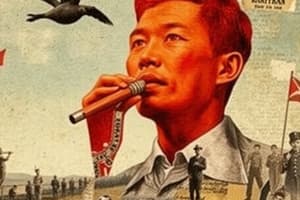Podcast
Questions and Answers
Who started the Philippine Revolution of 1896-1898?
Who started the Philippine Revolution of 1896-1898?
Andres Bonifacio
The Philippine revolutionaries were well-equipped compared to Spanish soldiers.
The Philippine revolutionaries were well-equipped compared to Spanish soldiers.
False (B)
What was the main goal of the Philippine Revolution?
What was the main goal of the Philippine Revolution?
- To promote Spanish culture
- To gain independence from Spain (correct)
- To establish a monarchy
- To become a Spanish colony
The history of the Katipunan in the Philippine Revolution is regarded as a national symbol for Philippine ______.
The history of the Katipunan in the Philippine Revolution is regarded as a national symbol for Philippine ______.
What internal issues caused the Philippine revolutionaries to weaken?
What internal issues caused the Philippine revolutionaries to weaken?
What does the caption of the image say?
What does the caption of the image say?
What type of clothing are the three men in the foreground wearing?
What type of clothing are the three men in the foreground wearing?
All individuals in the image have their faces clearly visible.
All individuals in the image have their faces clearly visible.
How many men are clearly visible in the foreground?
How many men are clearly visible in the foreground?
What is the appearance of the room in the background?
What is the appearance of the room in the background?
Flashcards are hidden until you start studying
Study Notes
Causes of the Philippine Revolution
- Initiated by Andres Bonifacio's group, Katipunan (KKK), aiming for Philippine independence from Spanish rule.
- Filipinos, although lacking resources, demonstrated remarkable courage against Spanish forces.
Key Events and Conflicts
- Despite being ill-equipped, the Filipino revolutionaries engaged in fierce battles with well-trained Spanish troops.
- Internal conflicts within the revolutionary forces contributed to the weakening of their efforts, posing significant challenges.
Outcome of the Revolution
- The revolution ultimately succeeded in achieving independence from Spain, marking a pivotal moment in Philippine history.
Legacy of the Katipunan
- The history and ideals of the Katipunan are celebrated as a symbol of Philippine nationalism and patriotism.
- The movement represents not only the fight against colonial oppression but also the broader struggle for national identity and independence.
Image Analysis
- Depicts a group of people with obscured features, primarily highlighted by red arrows.
- Central caption reads, "It's Them. They Did It.", indicating a sense of accusation or blame.
Foreground Figures
- Three men in traditional dark clothing are prominent in the foreground.
- Each man wears a clerical collar, suggesting a religious affiliation or role in a clergy.
- Their facial features are clearly visible, setting them apart from the crowd behind.
Background Context
- The background is crowded with additional figures, emphasizing the collective nature of the scene.
- Those in the background are facing away from the viewer, which adds to the anonymity and mystery of the group.
Overall Interpretation
- The image conveys themes of accusation and judgment, potentially in a religious or socio-political context.
- The obscured identities of the larger group may imply collective responsibility or complicity in an unspecified action or event.
Studying That Suits You
Use AI to generate personalized quizzes and flashcards to suit your learning preferences.




